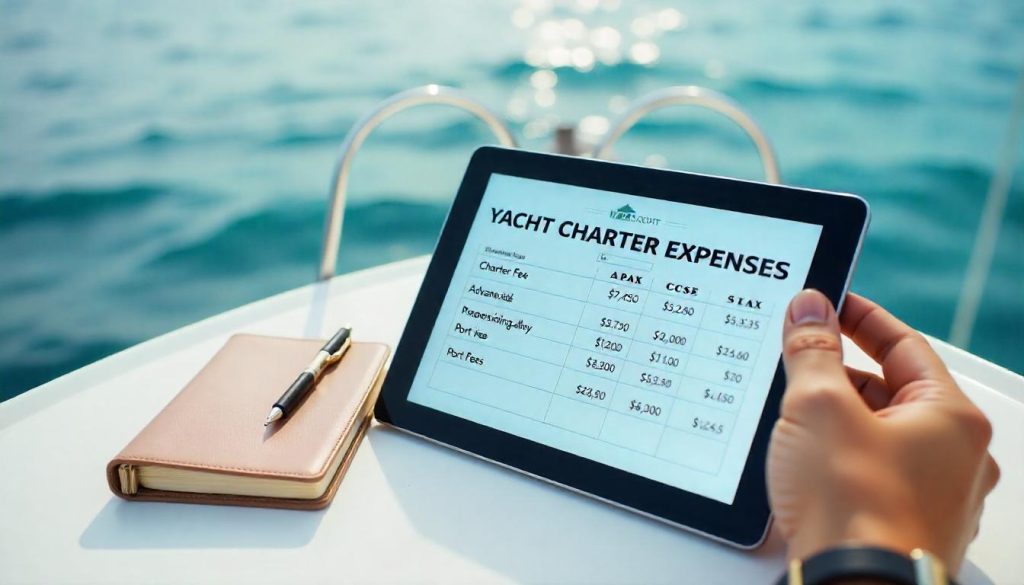The dream of a luxury yacht vacation evokes images of sun-drenched decks, crystal-clear waters, and unparalleled freedom. However, behind every seamless voyage lies a critical document: the yacht charter contract. This legal agreement forms the bedrock of your entire charter experience. Understanding its intricacies is not merely a formality; it is essential for protecting your investment and ensuring a smooth, transparent, and enjoyable journey. Whether you are planning an exotic escape or envisioning a serene cruise closer to home, even from a landlocked perspective like Aktobe, comprehending these agreements is paramount. This guide delves into the core components of yacht charter contracts, empowering you to navigate the booking process with confidence.
Why the Yacht Charter Contract is Paramount
A yacht charter contract serves as the blueprint for your luxury getaway. It outlines the rights and responsibilities of both the charterer (you) and the yacht owner/operator. Therefore, neglecting to fully understand its terms can lead to misunderstandings, disputes, or unexpected costs.
Protecting Your Investment
A substantial financial commitment is involved in booking a private yacht. The yacht charter agreement clearly defines the total cost, payment schedule, and what exactly is included. This protects you from hidden fees and ensures you receive the services and amenities you expect. Moreover, it outlines cancellation policies. This safeguard becomes crucial should unforeseen circumstances arise, allowing you to understand potential refunds or penalties. Consequently, it secures your financial stake in the voyage.
Defining Responsibilities and Expectations
This comprehensive document precisely details the duties of the charterer and the owner/crew. For instance, it specifies the yacht’s operational limits, safety regulations, and any restrictions on guest conduct. It also outlines the owner’s responsibility for maintaining the yacht in seaworthy condition. Furthermore, the contract typically covers crew duties, ensuring professional service. By clearly setting expectations, the contract minimizes ambiguity. Thus, it promotes a harmonious relationship throughout the charter period.
Ensuring a Smooth Experience
A well-drafted and understood contract is the foundation for a trouble-free charter. It provides a clear framework for all aspects of your trip. This includes the itinerary, guest numbers, and specific onboard services. Should any issues arise, the contract provides a reference point for resolution. Ultimately, it clarifies the terms of your private yacht lease. Therefore, you can fully relax and enjoy your luxurious escape, knowing all details are legally established.
Key Components of a Standard Yacht Charter Contract
While specific clauses may vary, most yacht charter contracts adhere to recognized industry standards, such as the Mediterranean Yacht Brokers Association (MYBA) Terms. Understanding these core components is crucial.
Parties Involved: Identification and Roles
The contract begins by identifying all parties. This includes the charterer(s), the yacht owner, and often the charter broker. Full legal names, addresses, and contact details are essential. The roles and responsibilities of each party are clearly delineated. For instance, the owner is responsible for the yacht’s seaworthiness. The charterer, conversely, agrees to abide by rules and respect the vessel. This clear identification establishes legal accountability.
Yacht Details: Specifications and Condition
The contract provides comprehensive details about the chartered yacht. This includes its name, type, length, flag, and year of build. Specific amenities and equipment are often listed, from tender boats to water toys. Crucially, the contract stipulates that the yacht must be delivered in a clean, seaworthy condition, properly crewed, and fully equipped. This protects you from receiving a vessel that does not meet the agreed-upon standards.
Charter Period and Itinerary
The contract precisely defines the start and end dates and times of your charter. It also specifies the embarkation and disembarkation ports. Any agreed-upon cruising area or itinerary limitations are explicitly stated. Flexibility is often discussed, allowing for adjustments based on weather or guest preferences. However, any changes must typically be approved by the captain and remain within safety limits. Understanding these temporal and geographical boundaries is fundamental to your luxury yacht booking terms.
Financial Terms: Fees, APA, and Payments
This section is perhaps the most critical. It details the charter fee, the Advance Provisioning Allowance (APA), taxes, and any other charges. It also sets out the payment schedule. Typically, a percentage (e.g., 50%) is due upon signing, with the remainder payable a month or so before embarkation. A security deposit might also be required. Clear financial terms prevent misunderstandings and ensure all costs are transparent.
Cancellation and Force Majeure
Every contract includes clauses for cancellation. These detail penalties or refunds based on when the cancellation occurs. A “Force Majeure” clause is also vital. This covers unforeseen circumstances beyond anyone’s control. Examples include severe weather, natural disasters, or global pandemics. Such clauses typically outline procedures for rescheduling, refunds, or deferrals in these extreme events. Understanding these terms provides crucial protection.
Understanding Financial Terms in Detail
The financial aspects of a yacht charter contract can sometimes seem complex. Breaking them down helps ensure full comprehension.
Charter Fee: What’s Included?
The basic charter fee covers the exclusive use of the yacht and its crew for the specified period. It generally includes the yacht’s insurance (for the owner), crew salaries, and maintenance. However, it typically excludes all other operational expenses. For example, fuel, provisions, dockage fees, and crew gratuities are usually separate. Always clarify precisely what the charter fee encompasses. This avoids any surprises later on.
Advance Provisioning Allowance (APA): Managing Expenses
The APA is a standard component in most crewed yacht charters. It is an additional sum, typically 25-35% of the charter fee, paid in advance. This allowance covers all variable expenses during your charter. These include fuel for the yacht and tender, food and beverages, port fees, customs charges, communications, and special requests. The captain manages the APA. They keep detailed accounts, providing you with receipts. Any unused APA is refunded at the end of the charter. If expenses exceed the APA, the charterer must top it up. This system ensures seamless payment for day-to-day operational costs. It is a crucial aspect of your charter party agreement.
VAT, Taxes, and Other Charges
Depending on the cruising area and the yacht’s flag, Value Added Tax (VAT) or local taxes may apply to the charter fee. These percentages vary significantly by region. For instance, some Mediterranean countries apply VAT, while others have different systems. Port fees, customs duties, and potentially local cruising taxes are also separate. Always confirm all applicable taxes and charges upfront with your broker. Ensure they are clearly itemized in the contract.
Payment Schedule and Security Deposit
The contract will outline a clear payment schedule. Typically, an initial deposit (e.g., 50% of the charter fee) is due upon signing the yacht charter contracts. The remaining balance, including the APA and any applicable taxes, is usually due 30-60 days before embarkation. A security deposit, distinct from the APA, may also be required. This covers potential damages beyond normal wear and tear. It is typically refunded after the charter, following a damage inspection. Adhering to these deadlines is crucial to secure your booking.

Important Clauses for Your Protection
Beyond the core financial and operational details, several clauses offer crucial protection for the charterer. Review these carefully.
Dispute Resolution: How Conflicts are Handled
Should a dispute arise, the contract outlines the agreed-upon method for resolution. This might involve mediation, arbitration (often under recognized maritime bodies), or legal proceedings in a specified jurisdiction. Understanding this clause is vital. It dictates how potential conflicts will be managed. For instance, it clarifies the applicable law governing the boat rental terms.
Insurance Coverage: Yours and Theirs
The yacht owner typically insures the vessel for hull and machinery, and third-party liability. However, this insurance usually does not cover the charterer’s personal liability, belongings, or trip cancellation. Therefore, charterers should always obtain their own comprehensive travel insurance. This policy should cover medical emergencies, personal accident, personal effects, and, crucially, charter cancellation. Confirming both parties’ insurance coverages helps prevent unexpected financial burdens.
Delivery and Redelivery Conditions
This clause specifies the exact conditions for the yacht’s delivery and redelivery. It confirms the yacht will be in seaworthy condition at the start of the charter. It also outlines expectations for its condition upon return. This includes cleanliness and any damages beyond normal wear and tear. Adhering to these conditions protects your security deposit. It ensures a smooth handover process.
Guest Conduct and Safety Rules
The contract will detail rules regarding guest conduct onboard. This includes prohibitions on illegal activities, excessive noise, or damaging the yacht. It also covers safety regulations, such as life jacket usage and tender operation. These rules are in place for the safety of all guests and the preservation of the vessel. Adhering to them is a contractual obligation.
The Role of Your Charter Broker
Your charter broker serves as your primary advocate throughout the entire process. Their expertise is invaluable when navigating complex yacht charter contracts.
Expertise and Negotiation
A reputable charter broker possesses extensive knowledge of the global charter fleet and industry practices. They can identify yachts that precisely match your preferences and budget. Moreover, they act as an intermediary, negotiating terms and conditions with the yacht owner or their central agent. Their experience helps secure favorable clauses and clarify any ambiguities. This expertise ensures you get the best possible yacht charter agreement.
Reviewing the Yacht Charter Agreement
A competent broker will meticulously review the contract on your behalf. They will explain complex legal jargon and ensure all agreed-upon terms are accurately reflected. They can identify any unusual clauses or potential pitfalls, advising you on necessary amendments. Their guidance is crucial for understanding your obligations and rights before signing. This provides an added layer of protection.
Post-Charter Support
A good broker’s service extends beyond the booking. They can assist with any issues that might arise during or after the charter, such as disputes over the APA or minor damages. They act as a liaison, helping to resolve matters fairly and efficiently. Their ongoing support ensures a positive overall experience, from initial inquiry to final disembarkation.
Before Signing: Due Diligence and Tips
Signing a yacht charter contract is a significant commitment. Therefore, take your time and follow these critical steps.
Read Every Word Carefully
Do not rush. Read the entire contract thoroughly, section by section. Pay close attention to the financial terms, cancellation policies, and liability clauses. If anything is unclear, do not hesitate to ask for clarification. Remember, a signed contract is legally binding.
Clarify All Questions
Compile a list of all your questions and concerns. Address these with your charter broker. Ensure you receive satisfactory answers to every query before putting your signature on the document. No question is too small when it comes to understanding your boat rental terms.
Seek Legal Counsel (if complex)
For particularly complex or high-value charters, consider having an independent maritime lawyer review the contract. They can provide unbiased advice and ensure your interests are fully protected under relevant maritime law. This added layer of scrutiny offers peace of mind.
Document Everything
Keep a comprehensive record of all communications. This includes emails with your broker, any amendments to the contract, and receipts for payments. Should any dispute arise, this detailed documentation will be invaluable. It provides a clear timeline and record of agreements.
In conclusion, understanding the essentials of yacht charter contracts is fundamental to a successful and enjoyable luxury boating experience. While the allure of the open sea is undeniable, the legal framework provided by a comprehensive agreement ensures peace of mind. By diligently reviewing the terms, leveraging the expertise of a reputable broker, and asking informed questions, you can embark on your dream yacht charter with confidence, knowing your voyage is protected.

 The Essentials of Yacht Charter Contracts">
The Essentials of Yacht Charter Contracts">
